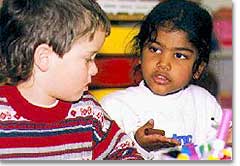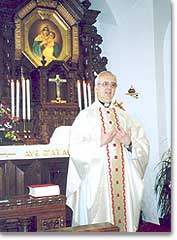 |
|
Laura Restrepo, Colombia, autora de "La multitud errante" Laura Restrepo, Columbia, author of "The errand crowd" Laura Restrepo, Kolumbien, Autorin von "Die umherirrende Menge" |
|
 |
|
Los inmigrantes son, en general, fáciles de distinguir... The immigrants are generally easy to distinguish... Es fällt nicht schwer, die Immigranten zu erkennen… Fotos: Archiv |
|
 |
|
El Santuario, hogar del mundo.... The Shrine, home of the world... Das Heiligtum, Heimat der Welt… Foto: Gold © 2003 |
|
|
ROME, Fr. Alberto Eronti. Dozens of people die daily in boats, trucks, deserted roads or in the sea; they die of hunger and thirst in the search for a home in the lands of their dreams. They wish for less violence, more security and better living conditions. But these lands don't want to receive them. The publishing of the book The Wandering Crowd by Laura Restrepo makes us think of the hidden longing in every man's search -- to return home. But, where is home?
Since my arrival in Italy over a year ago, one of the realities that amazed me was that of the immigrants. It is not only an Italian issue, it is a problem of all Europe (and farther). The immigrants are generally easy to spot: the color of the skin, their dress, their features, their language, etc. It is an issue that has existed for years and that grows each summer due to the countless groups trying to get to Western Europe. The newspapers show almost every day the number of clandestine immigrants dying on the journeys or being caught arriving on beaches or harbors. My conclusion is that the European Union is not succeeding in a reasonable agreement to handle this reality, and for Italy the problems are multiplied because they are confronted by waves of immigrants coming from North Africa, Rumania, Bosnia, Ukraine, etc. The immigrants from South America differ from those because their advantage is to be Latin and in most cases of Italian descent. The immigrants from South America differ from those because their advantage is to be Latin and in most cases of Italian descent.
The Wandering Crowd
Since the subject interests me my attention was attracted by a presentation that Fr. Guillermo Arboleda, Benedictine, made of the book The Wandering Crowd by the Colombian writer Laura Restrepo.
The book was written about the situation in Colombia where each day, according to government polls, over one thousand persons leave their homes and their homeland due to the guerrillas’ coercion. More than 50 years living in the middle of violence! To emigrate is not the same as being a "wanderer". What Restrepo tells us about her country is also true in a major part of the globe. "Those of us from the South press on to enter the North and those in the North resist to receive us. It is now not only "the dream of the North" that entices and attracts us; no, it is the South nightmare pushing us out and making us run away. And faced with the hordes of desperate Southerners who manage to, not just enter, but intrude and invade; close the borders, make tougher treaties to protect themselves in a block and so there is violence and aggressive xenophobia," says Arboleda. In this line he continues, "This immigration movement has a different name in our countries injured by injustice and corruption, by the misery and the internal fights (remember there are 37 forgotten wars South of the Equator); it is called displacement. Hundreds of thousands of men and women who each day leave their places of origin, their familiar grounds, in search of a minimum of security which will allow them a more decent and humane life. And this is the nightmare because these displaced people increase the wandering crowd, always growing, always in motion, sometimes receiving welfare but always left on their own. The result is dramatic: excluded from the system, the crowd of wanderers becomes more and more impoverished, lives in detachment, in ambulatory humiliation, hiding from the authorities (for lack of documentation), don’t have their own place and they are unwelcome everywhere.
A process of exclusion
In any case we continue listening to the "triumphant hymn" of the sponsors of globalization who present it to us as the gospel: the global village that will give us all a shelter, with a center generating goodness... Contrary to the ideal "sold" to us, those growing in number are not the included but the excluded. The mention of a planetary unity is a false illusion; the facts have proved the opposite. The globalization in spite of the appearances is actually a process of exclusion.
The challenge is to redeem the globalization, not to deny it but to give it a soul
The amazing new possibilities of communication do not automatically consolidate the personal and humanitarian relations, and does not provide an effective solidarity. What is produced is another kind of evasive nomad; navigating without a rudder across the "cyber space. The neighbors, the close and real neighbors are being replaced by virtual friends. Real detached beings who are virtual wanderers and that actually also add to the number of the wandering crowd. Detachment, nomadic existence, foreign, all speak of a crumbling of the identity of people and minorities. The globalisation’s own logic with economy as a moving power, calls for a homogenous culture, production and consumerism. The enticement of the holy and the divine is also reborn stronger and without control, and it manifests in the corresponding growth of the offer and demand in the "religious supermarket", with its infinity of variety and unlimited possibilities of product combination in a "menu made to the consumers taste." In the middle of all this we hear the cry (Rom. 8,22) inspired by the Spirit of God and in which the rescue of humanity loved by God is put to the test. The longing for a return home. To go back home! This is the only North that will free the wandering crowd from humiliating nomadism. The challenge is to rescue the globalization and to give it a soul not to deny it.
To make a home and a school of communion in the Church
The announced global village is an undeniable fact but it is also an undeniable fact that in the end it is a home for no one. In this "village" the human figure is not only not the center but it is evaporating more and more.. That is the reason for that fundamental longing of returning home, because it is everybody’s right to have roots, own a house, as a primary and irreplaceable prerequisite of fraternity and universal peace. That is why we must receive and live as a mission the words of the Pope: "To make the Church a home and a school of communion: this is the great challenge of this new millennium, if we want to remain faithful to God’s will and also to answer the deep hopes of the world." (NMI, 43)
Where pedagogy and theology meet, nature and grace find each other - the Shrine!
While reflecting on what I wrote I remembered Fr. Kentenich’s words in the Educational Conferences in 1951: "Dass neue Menschen werden" (Let the new man become). In them Father develops not only his concept of home but also its definite importance in the postmodern times. Father says: ..."the home problem, to the extent that we understand it and present it is in last instance the problem of today’s culture. The lack of home is the nucleus of today’s cultural crisis. Of course, we understand homelessness in a general sense." The problem of "homelessness" as Father perceives it, shows: detached, individualistic, weak and incapable of creating lasting relationships. That is why he speaks of detachment as an experience of "hell." In this context, he quotes Nietzsche: "Pity the man without a home." That is why Father pedagogically emphasizes the need for attachments, for shelter, but he goes beyond pedagogy, he centers in the essential and primary attachment: God. Here is where pedagogy and theology meet, nature and grace find one other and Father shows us the "Home" of this fusion: the Shrine, the place where Mary lives and by Her and in Her the Trinity, which is the primary and ultimate "home". The lack of home, says Father, means "lack of soul, character and religion." We should reflect on each of these words and its reach in the world of today, when the new millennium confirms that the "new times" are here and urge the Mission.
Translation: Carmen Barruel, Belgium/Maureen Donnelly, Chicago, USA